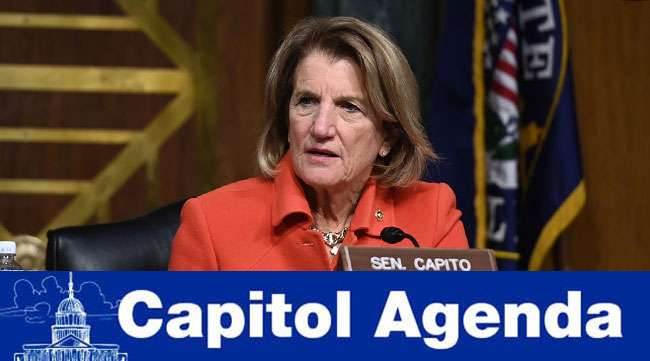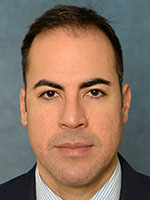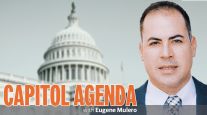Senior Reporter
Lawmakers, Stakeholders Spotlight Deficient Bridges, Infrastructure Funding Needs

[Stay on top of transportation news: Get TTNews in your inbox.]
This will be a big month for infrastructure policy in Washington. Federal officials at the transportation committees plan to meet for hearings that examine concerns across the nation’s mobility grid. Stakeholders will continue to highlight pressing concerns related to highways, transit, rail, ports, waterways and broadband in hopes for the adoption of long-term funding bills and severe-weather-resilience mandates.
After enactment of a new round of COVID-19 emergency aid, the Biden White House suggested it would unveil a policy framework meant to help policymakers navigate the legislative process.
Garnering the requisite political agreement to pass meaningful funding measures for infrastructure projects has been elusive. Disagreement continues over ways to pay for long-term projects.

Mulero
For the time being, at least there is consensus among the political class on the need to do something to repair roads and bridges.
Addressing the American Association of State Highway and Transportation Officials last week, Sen. Shelley Moore Capito (R-W.Va.), acknowledged something needs to get done.
“One of the areas that I have particular interest in … is our bridges. I am very concerned about the state of our deficient bridges. We have a lot of bridges in West Virginia,” she told the state transportation officials. Capito is the ranking member on the Environment and Public Works Committee, “And unfortunately, we have a lot that are deficient. Now that doesn’t mean that they’re going to fall down tomorrow, but it does mean that if we don’t pay attention to them and if we don’t devote the resources, that we’re going to have large problems into the future. And we know every expensive ones.”
AASHTO President Victoria Sheehan Senate Testimony by Transport Topics on Scribd
Her sentiment, specific to structurally deficient infrastructure, was echoed by fellow leaders of the transportation panels on Capitol Hill.
State officials also agreed with Capito. AASHTO President Victoria Sheehan highlighted for senators the importance of approving a new highway policy bill that avoids funding disruptions and preserves ongoing safety programs. She also pointed out potential benefits linked to innovation and technology across the highway system.
Sheehan told the EPW committee Feb. 24: “State DOTs are absolutely dedicated to supporting Congress in the development of strategies to ensure full economic recovery and growth, and enhancing quality of life through robust investments in transportation programs and projects.”
State DOTs are absolutely dedicated to supporting Congress in the development of strategies to ensure full economic recovery and growth.
AASHTO President Victoria Sheehan
The American Society of Civil Engineers determined in a recent report that 21% of West Virginia’s bridges are structurally deficient, or 1,531 out of 7,291 bridges in the state. For the country, the group of engineers concluded that in 2016, about 56,000, or 9%, of bridges were structurally deficient. ASCE and other groups insist Congress’ inability to pass significant infrastructure policy has affected efforts to fix these bridges.
The Week Ahead (all times Eastern)
March 2, 10 am: House Transportation and Infrastructure Committee “COVID-19’s Effects on U.S. Aviation and the Flight Path to Recovery”
March 3, 10 a.m.: Senate Commerce meets for nomination hearing with Polly Trottenberg to be deputy secretary of transportation.
March 3, 10 a.m.: Senate Environment and Public Works Committee meets for “Hearing on the Nominations of Brenda Mallory to serve as chair of the White House Council on Environmental Quality and Janet McCabe to be deputy administrator of the Environmental Protection Agency.” Watch live here.
Freight Corridor
Because the business of America is business.
Legislative Docket
A national program that promotes safety features for street designs recently was introduced by transportation policymakers. The Complete Streets Act would require state agencies to use federal funds for what are known as “complete streets” projects. Such projects are meant to apply myriad safety features along intersections and certain corridors to enhance users’ experience.
Complete Streets Legislation by Transport Topics on Scribd
“Year after year of increasing fatalities demand that we make significant investments to ensure safety for all users of the road,” Sen. Ed Markey (D-Mass.), a Commerce Committee member said Feb. 24.
 Buzz
Buzz

The 2021 ASCE infrastructure report card will be unveiled March 3.
Favorite Video
It’s all about the benjamins.
Favorite Tweet
Former Secretary Anthony Foxx, what’s on your mind?
I usually let things slide but the amnesia problem is getting a little crazy. For example, transportation expert, David Zipper (who is he?), says, “If you were to ask me what policies specific to equity the U.S. DOT implemented under Obama, I would struggle to answer you.” 1/9 — anthonyfoxx (@anthonyfoxx) February 26, 2021
The Last Word
Strengthening transparency and funding of the Tribal Transportation Program will increase infrastructure investment and improve road safety.
Sen. Kyrsten Sinema (D-Ariz.) on Feb. 23
We publish weekly when Congress is in session. E-mail emulero@ttnews.com with tips. Follow us @eugenemulero and @transporttopics.
Want more news? Listen to today's daily briefing below or go here for more info:




